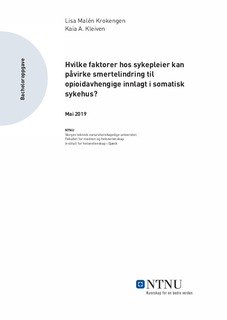| dc.contributor.advisor | Fossum Ødegaard, Siri | |
| dc.contributor.author | Krokengen, Lisa Malén | |
| dc.contributor.author | Kleiven, Kaia A. | |
| dc.date.accessioned | 2019-09-06T14:04:48Z | |
| dc.date.available | 2019-09-06T14:04:48Z | |
| dc.date.issued | 2019 | |
| dc.identifier.uri | http://hdl.handle.net/11250/2613391 | |
| dc.description.abstract | SAMMENDRAG
Hvilke faktorer hos sykepleier kan påvirke smertelindring til opioidavhengige innlagt i somatisk sykehus?
16.05.2019
Deltakere: Lisa Malen Krokengen
Kaia Kleiven
Veileder:
Siri Ødegaard Fossum
Nøkkelord: Opioidavhengighet, sykepleie, kunnskap, holdninger, smertelindring
Antall sider/ord: 46 sider, 10820 ord
Antall vedlegg:4
Bakgrunn: Det finnes omfattende forskning på smerte og smertelindring, men lite om smertebehandling av rusavhengige pasienter. Derimot er underbehandling av smerter hos denne pasientgruppen godt dokumentert. Holdninger, stigmatisering og utilfredsstillende kunnskap hos helsepersonell er faktorer som kan bidra til dette.
Hensikt: Hensikten med oppgaven er å finne ut hvilke egenskaper, og bakgrunnen for handlingsvalg som tas av sykepleier, som kan påvirke smertelindringen hos opioidavhengige innlagt i somatisk sykehus. Herunder egenskaper som holdninger, kunnskap og erfaringer, samt handlingsvalg som kan være påvirket av egenskapene og stigmatisering.
Metode: Litteraturstudie med fire kvalitative og to kvantitative artikler som belyser tema for valgt problemstilling. Valgte artikler er funnet i databasene; Medline (Ovid), Cinahl og Swemed +.
Resultat: Basert på funn i artiklene er hovedfunnene at helsepersonell generelt har lav kunnskap knyttet opp mot smertelindring av opioidavhengige pasienter, og at sykepleiers holdninger er til hinder for god pasientomsorg. Disse holdningene er i stor grad relatert til utilfredsstillende kunnskap og kompetanse. Funn tyder på at bedre bruk av kartleggingsverktøy rettet mot smerte, og kartlegging av bruks – og avhengighetstype, samt økt kunnskap kan føre til bedre smertelindring, og bedre pasientpleie.
Konklusjon: Funn gjort i forskningslitteratur og annen litteratur konkluderer med at sykepleiere ikke har tilfredsstillende nok kunnskap om smertelindring til denne pasientgruppen, og at holdninger og stigmatisering relatert til utilfredsstillende kunnskap er funnet til å bidra til inadekvat smertelindring. Bruk av kartleggingsverktøy har blitt funnet til å være lite brukt, og ansett som ikke nødvendig, til tross for at studier viser viktigheten og nytten av kartlegging. | |
| dc.description.abstract | ABSTRACT
Title
Which factors in nursing may influence the pain management of inpatients with opioid addiction?
16.05.2019
Participants: Lisa Malen Krokengen
Kaia Kleiven
Supervisor: Siri Ødegaard Fossum
Keywords:
Opioid addiction, nursing, knowledge, attitudes, pain management
Number of pages/words: 46 pages, 10 820 words
Number of appendix :4
Background: There is extensive research on pain and pain relief, but little on the pain management of patients with opioid addiction. However, undertreatment of pain within this patient group is found to be well documented. Attitudes, stigmatization and unsatisfactory knowledge are factors that can contribute to this.
Purpose: Identify which characteristics, and the background for choice of action taken by the nurse, which can affect the pain relief in the opioid addictive inpatient. Including qualities such as attitudes, knowledge and experiences, as well as choices of action that can be influenced by the characteristics and stigmatization.
Methods: Literature study with four qualitative and two quantitative articles that highlight the theme of the chosen issue. Selected articles are found in the following databases; Medline (Ovid), Cinahl and Swemed+.
Results: Based on findings in the articles, the main findings show that health professionals have low knowledge related to pain relief of the opioid-addicted patient, and that nursing attitudes prevent good patient care. These attitudes are to a great extend related to unsatisfactory knowledge and competence. Findings indicate that better use of mapping tools aimed at pain, and mapping of use and addiction type, as well as increased knowledge, can lead to better pain relief, and better patient care.
Conclusion: Findings made in research literature and other literature conclude that nurses do not have enough knowledge about pain relief for this patient group, and that attitudes and stigmatization related to unsatisfactory knowledge have been found to contribute to inadequate pain relief. The use of mapping tools has been found to be of little use, and not considered necessary, despite studies showing the importance and usefulness of this measures. | |
| dc.language | nob | |
| dc.publisher | NTNU | |
| dc.title | Hvilke faktorer hos sykepleier kan påvirke smertelindring til opioidavhengige innlagt i somatisk sykehus? | |
| dc.type | Bachelor thesis | |
